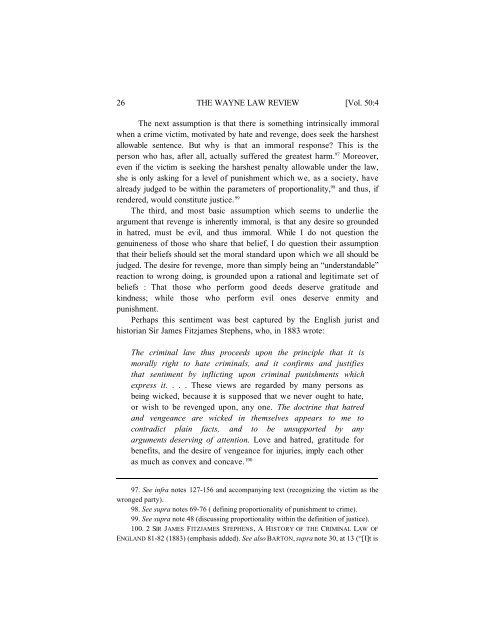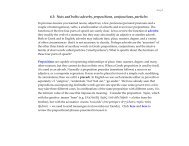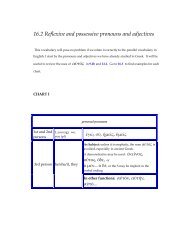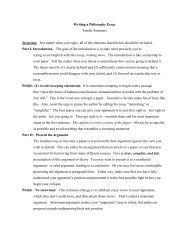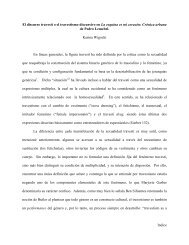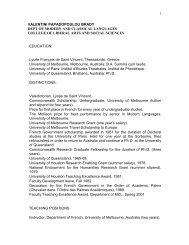Revenge, Justice, and the Law
Revenge, Justice, and the Law
Revenge, Justice, and the Law
Create successful ePaper yourself
Turn your PDF publications into a flip-book with our unique Google optimized e-Paper software.
26 THE WAYNE LAW REVIEW [Vol. 50:4<br />
The next assumption is that <strong>the</strong>re is something intrinsically immoral<br />
when a crime victim, motivated by hate <strong>and</strong> revenge, does seek <strong>the</strong> harshest<br />
allowable sentence. But why is that an immoral response? This is <strong>the</strong><br />
person who has, after all, actually suffered <strong>the</strong> greatest harm. 97 Moreover,<br />
even if <strong>the</strong> victim is seeking <strong>the</strong> harshest penalty allowable under <strong>the</strong> law,<br />
she is only asking for a level of punishment which we, as a society, have<br />
already judged to be within <strong>the</strong> parameters of proportionality, 98 <strong>and</strong> thus, if<br />
rendered, would constitute justice. 99<br />
The third, <strong>and</strong> most basic assumption which seems to underlie <strong>the</strong><br />
argument that revenge is inherently immoral, is that any desire so grounded<br />
in hatred, must be evil, <strong>and</strong> thus immoral. While I do not question <strong>the</strong><br />
genuineness of those who share that belief, I do question <strong>the</strong>ir assumption<br />
that <strong>the</strong>ir beliefs should set <strong>the</strong> moral st<strong>and</strong>ard upon which we all should be<br />
judged. The desire for revenge, more than simply being an “underst<strong>and</strong>able”<br />
reaction to wrong doing, is grounded upon a rational <strong>and</strong> legitimate set of<br />
beliefs : That those who perform good deeds deserve gratitude <strong>and</strong><br />
kindness; while those who perform evil ones deserve enmity <strong>and</strong><br />
punishment.<br />
Perhaps this sentiment was best captured by <strong>the</strong> English jurist <strong>and</strong><br />
historian Sir James Fitzjames Stephens, who, in 1883 wrote:<br />
The criminal law thus proceeds upon <strong>the</strong> principle that it is<br />
morally right to hate criminals, <strong>and</strong> it confirms <strong>and</strong> justifies<br />
that sentiment by inflicting upon criminal punishments which<br />
express it. . . . These views are regarded by many persons as<br />
being wicked, because it is supposed that we never ought to hate,<br />
or wish to be revenged upon, any one. The doctrine that hatred<br />
<strong>and</strong> vengeance are wicked in <strong>the</strong>mselves appears to me to<br />
contradict plain facts, <strong>and</strong> to be unsupported by any<br />
arguments deserving of attention. Love <strong>and</strong> hatred, gratitude for<br />
benefits, <strong>and</strong> <strong>the</strong> desire of vengeance for injuries, imply each o<strong>the</strong>r<br />
as much as convex <strong>and</strong> concave. 100<br />
97. See infra notes 127-156 <strong>and</strong> accompanying text (recognizing <strong>the</strong> victim as <strong>the</strong><br />
wronged party).<br />
98. See supra notes 69-76 ( defining proportionality of punishment to crime).<br />
99. See supra note 48 (discussing proportionality within <strong>the</strong> definition of justice).<br />
100. 2 SIR JAMES FITZJAMES STEPHENS, A HISTORY OF THE CRIMINAL LAW OF<br />
ENGLAND 81-82 (1883) (emphasis added). See also BARTON, supra note 30, at 13 (“[I]t is


